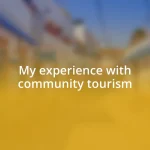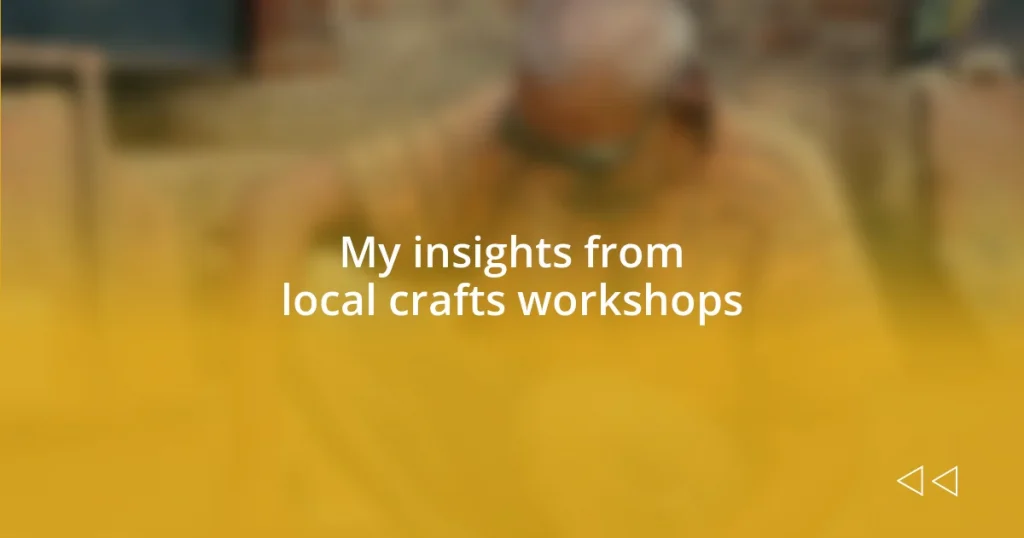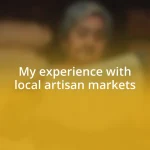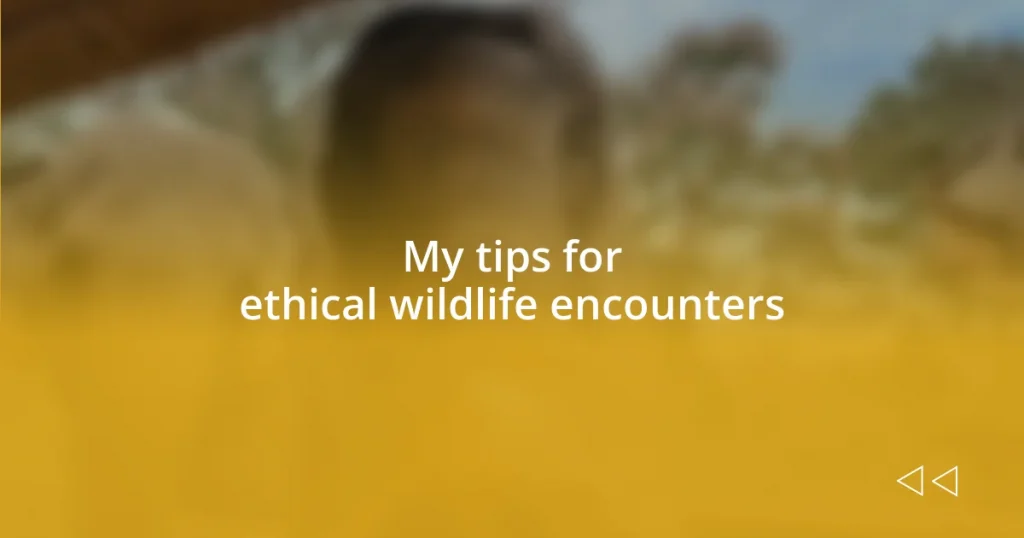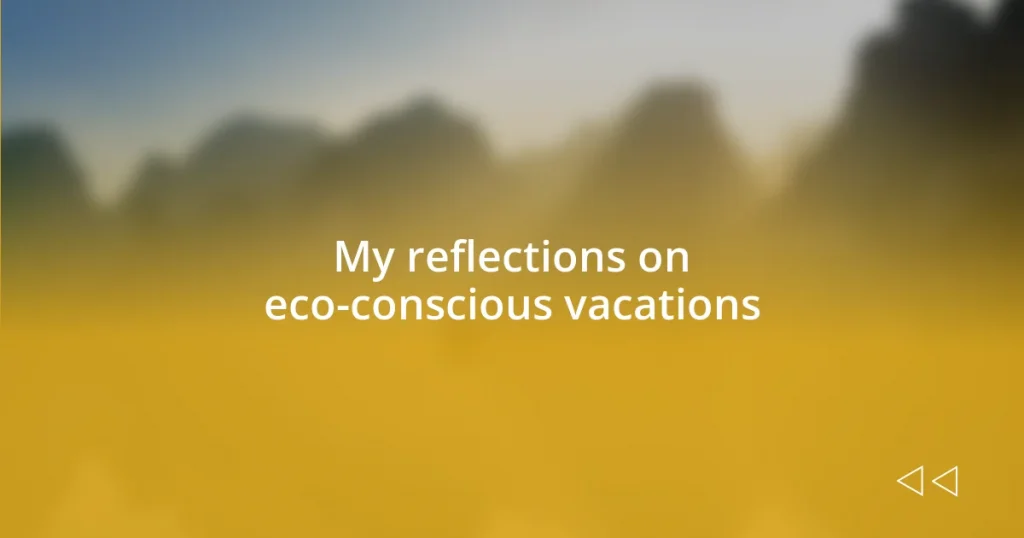Key takeaways:
- Local crafts workshops enhance creativity, community connection, and cultural appreciation, providing a supportive environment for personal growth.
- Participants acquire diverse skills, such as ceramics, jewelry making, and storytelling through crafts, often sharing experiences that foster collaboration.
- Maximizing workshop value involves preparation, engaging with fellow participants for inspiration, and documenting the creative process to capture insights for future projects.

Understanding local crafts workshops
Local crafts workshops serve as vibrant hubs for creativity and community connection. When I first stepped into a pottery workshop, I was struck by the buzz of energy and excitement in the air. Have you ever felt that electric atmosphere where everyone is on the same journey of discovery? It’s infectious!
These workshops often provide not just hands-on experience, but also valuable insights into the cultural significance of the crafts. For instance, during a weaving session, I learned about the history behind each pattern and its connection to the local heritage. This made me realize how much each twist of thread holds a story—how often do we overlook the narratives woven into our everyday surroundings?
Engaging in these craft sessions goes beyond simply learning a skill; it fosters a sense of belonging. I remember bonding with fellow participants over shared struggles and breakthroughs, which created a beautiful tapestry of laughter and encouragement. In a world where we sometimes feel disconnected, isn’t it comforting to find a community that celebrates creativity and collaboration?

Benefits of participating in workshops
Participating in workshops offers a profound sense of accomplishment and personal growth. The first time I tried my hand at wood carving, I was amazed at what I could create with just a few tools and some patience. That moment of seeing my rough piece of wood transform into an intricate design instilled a confidence in my abilities that I carry with me to this day. It’s incredible how trying something new can expand your horizons and build self-esteem.
The benefits don’t stop there. Workshops are also a great way to develop new skills and strengthen existing ones. Here’s a quick rundown of some benefits you might experience:
- Skill Improvement: Focus on specific techniques tailored to your interests.
- Networking Opportunities: Connect with like-minded individuals who share your passion.
- Access to Expertise: Learn from experienced artisans who provide unique insights.
- Therapeutic Outlet: Engage in a mindful activity that promotes relaxation and reduces stress.
- Cultural Appreciation: Gain a deeper understanding of local traditions and artistry.
Reflecting on my experiences, it’s thrilling to see how each workshop amplifies your creativity, encouraging you to explore new avenues you might not have considered before. Isn’t it fascinating how much can unfold from shared experiences in a colorful, supportive environment?

Skills learned in local workshops
Taking part in local workshops taught me many skills that I never thought I’d acquire. For example, learning to work with clay in a ceramics class was more than just about shaping pots; it was about finding the right rhythm and flow. I remember the first time I attempted to throw a pot on the wheel. My heart raced, but as my hands molded the spinning clay, I felt an exhilarating sense of control. Have you ever felt that moment when everything just clicks? It was a mix of anxiety and joy that I’ll never forget.
Then there’s the beauty of learning alongside others. At a local jewelry-making workshop, I discovered not just how to solder metal, but also how to collaborate creatively with my neighbors. We shared tools and tips, even brainstorming together to tackle tricky designs. It’s remarkable how a supportive environment can spark innovative ideas and reveal hidden talents. Do you see how these workshops create a collaborative spirit that enriches the learning process?
One skill that stands out to me is the art of storytelling through crafts. While crafting a traditional basket in a recent workshop, I was entranced by the instructor’s tales about the techniques passed down through generations. It wasn’t just about weaving material; it was about weaving history and culture into each piece. That realization made me appreciate crafting on a deeper level. What stories do you think your own creations might tell?
| Skill | Description |
|---|---|
| Ceramics | Creating pottery and understanding the technique of throwing on a wheel. |
| Jewelry Making | Designing and crafting jewelry while learning collaboration techniques. |
| Basket Weaving | Mastering the weaving of traditional baskets while discovering cultural stories. |

Unique materials used in crafts
Exploring unique materials in crafts opens a world of possibilities. I remember attending a workshop where we used recycled paper to create beautiful handmade cards. It felt incredible to turn something so ordinary into a stunning piece of art. Have you ever thought about how much potential lies in what we often discard? It’s a powerful reminder of creativity’s ability to breathe new life into the mundane.
While at another workshop, we worked with upcycled textiles—old shirts, curtains, and even vintage fabric scraps. The instructor encouraged us to embrace imperfections, and I loved the idea of stitching together memories. Each patch had its own story, and as I crafted, I reflected on the life it once had. Isn’t it amazing how a simple stitch can connect us to history in such a tangible way?
One of my favorite experiences involved the use of natural dyes made from local plants. As we simmered leaves and roots, I felt a deep connection to nature and our environment. It was fascinating to watch the colors emerge, transitioning through shades I never expected. Have you ever thought about how nature provides us with all the pigments we need? It brought a whole new dimension to my crafting, reminding me that sustainability can be beautiful.

Connecting with local artisans
Connecting with local artisans is an experience that truly enriches the crafting journey. I remember attending a woodturning workshop where the artisan shared not just the technical aspects of his craft, but also his passion and dedication to preserving traditional methods. It was more than just learning how to create beautiful wooden bowls; it was about understanding the time and effort that went into each piece. Have you ever met someone whose enthusiasm is so contagious that it inspires you to immerse yourself in a new skill?
During another session, I witnessed the profound connection between the artisan and their community. As we learned to create intricate pottery designs, the instructor spoke fondly of her childhood memories spent in her grandmother’s studio, a place where creativity and love intertwined. This personal history added depth to the workshop, reminding me that each crafted item carries the spirit of its maker. How do the stories behind your favorite handmade items shape your appreciation for them?
Lastly, I was captivated by the close-knit relationships that formed among participants while working with these artisans. In one such workshop, while sculpting clay alongside strangers, laughter and shared frustration turned us into friends. The moment we collectively sighed in relief over a successfully formed piece was unforgettable. Isn’t it interesting how a simple act of creating can forge connections that last beyond the workshop? Each interaction reminded me that crafting is not just about the final product but also the bonds we build along the way.

Insights from my workshop experiences
One of my most memorable discoveries in crafting workshops has been the sheer joy of experimentation. I took a class on mosaic art, where we were encouraged to let go of our traditional notions of ‘right’ and ‘wrong’ in art. I remember my initial hesitation as I glued down mismatched pieces of tile, yet watching them come together into a vibrant design was exhilarating. Have you ever allowed yourself to playfully explore your creative side without the fear of making mistakes? That moment of liberation was not just about the art; it was a life lesson in embracing imperfection.
Another insight that stands out is how crafting encourages mindfulness. During a fiber arts workshop, I found myself completely immersed in the rhythmic motion of spinning yarn. With each twist, I felt the stress of daily life fade away, replaced by a meditative calm. This experience made me ponder—how often do we give ourselves the chance to be fully present in the moment? Crafting isn’t just a hobby; it’s a pathway to discovering peace within the chaos of life.
Lastly, I realized that sharing my creative journey with others adds layers of meaning to the experience. One day, while participating in a community quilt-making event, I shared stories behind the fabrics I chose, and others did the same. As we stitched together not just the fabric but our shared stories, I felt an incredible connection grow among us. Isn’t it fascinating how creativity can weave our narratives together? That workshop taught me that crafting isn’t merely an act of creation; it’s also a celebration of community and shared experiences.

Tips for maximizing workshop value
To maximize the value of any crafting workshop, I’ve found that preparation is key. Before attending, I like to think about what I truly want to gain from the experience. For instance, in a recent jewelry-making workshop, I spent time researching different techniques and materials. This approach not only helped me ask more insightful questions but also allowed me to engage with the instructor on a deeper level. Have you ever felt that your level of preparation significantly impacted your learning experience?
Engaging with fellow participants is another strategy I highly recommend. In a recent fabric dyeing workshop, I made it a point to chat with others while we mixed colors and experimented with techniques. Some shared tips about specific dyes, while others offered creative inspirations for future projects. I realized that the collaborative spirit we foster during these workshops can often lead to unexpected insights. Isn’t it amazing how sharing ideas can spark our creativity even further?
Lastly, I believe that documenting the process is crucial. During a pottery workshop, I began taking notes and snapping pictures of my progress step-by-step. Later, this record became invaluable as it reminded me not just of the techniques but also of the emotions I felt during the creation process. Keeping a journal of your crafting experiences—what resonated with you and what challenged you—can transform your workshop learnings into actionable steps for future endeavors. How often do we forget valuable insights simply because we don’t take the time to capture them? It’s a small effort that pays off immensely in the long run.








